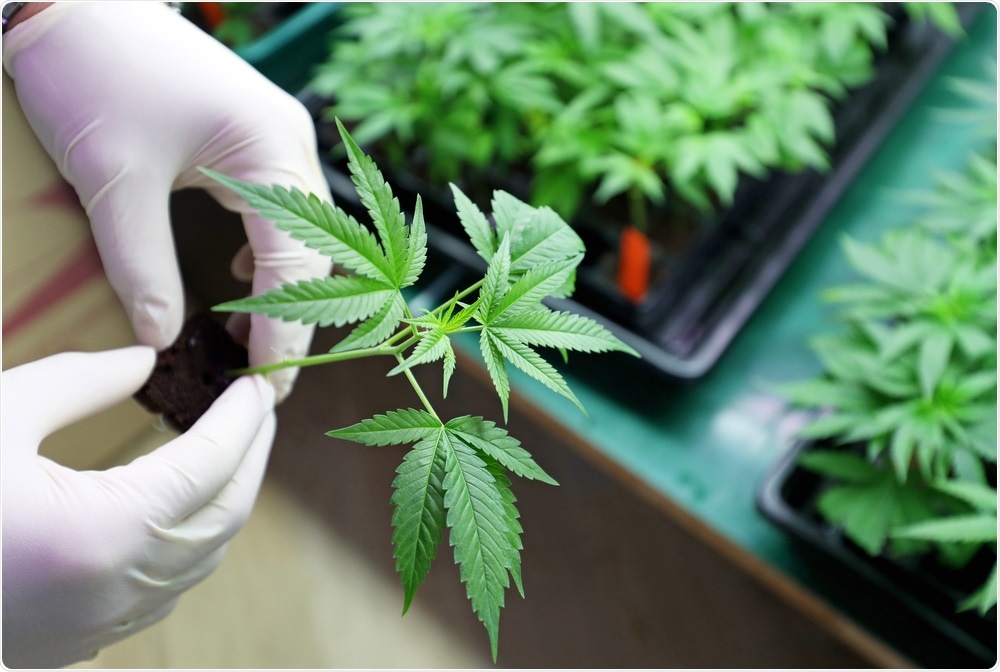A study published this month in the journal Nature Neuroscience has provided evidence to suggest that cannabis use before and during the early stages of pregnancy, may increase the risk of psychiatric disorders in newborns. However, the researchers have also suggested a potential therapy to combat the detrimental impact of THC exposure.
 Image Credit: photolona / Shutterstock.com
Image Credit: photolona / Shutterstock.com
Cannabis use before and during early pregnancy may pose harmful risks to babies
This research comes to us in light of the increasing legalization of medicinal and recreational marijuana use across the US. Health professionals are concerned over the impact that cannabis use both before and during the early stages of pregnancy could have on the growing fetus.
With cannabis being used by some to the treat morning sickness and lower back pain associated with pregnancy, scientists have begun looking deeper into the relationship between marijuana use and the long-term health impact on babies.
THC is linked to an increased risk of psychiatric disorders
Researchers at the UMSOM teamed up with those at the University of Cagliari (Italy) and the Hungarian Academy of Sciences, to conduct a new study looking into the impact of prenatal exposure to THC using a preclinical animal model.
The scientists found that THC exposure influenced the growing baby’s brain's dopamine neurons, making them hyperactive and increasing their sensitivity to the behavioral effects of THC during pre-adolescence.
It has been suggested that the impact on dopaminergic neurons may lead to an elevated risk of disorders such as schizophrenia and other forms of psychosis. These findings support those of previous studies, which have linked an increased risk of psychiatric disorders with prenatal cannabis use.
A potential therapy to reduce the effects of THC
The study found that male rats who were exposed to THC in the womb were more likely to show an increased susceptibility to THC. In addition, they found elevated levels of dopamine in the brains of the teenage males, specifically in the ventral tegmental area, thought to be responsible for reward motivation.
The male offspring who had been exposed to THC were seen to be more likely to engage in risky behaviors, those that are reminiscent of behaviors seen in numerous psychiatric disorders.
What’s important is that researchers found that they could prevent these behavioral problems by administering the rats with pregnenolone. This drug is already being used to treat various mental health issues such as bipolar disorder and schizophrenia, in some cases it is also used to treat people diagnosed with autism.
The significance of the findings of the study is that a potential therapeutic direction has been identified for treating those exposed to TCH in the womb. The research opens avenues for further research into the function of pregnenolone on the brain.
More studies will need to be done to understand the full therapeutic potential of the drug. In addition, the study signals that health cautions may be required relating to the use of cannabis pre and during pregnancy. However, again, more studies will need to be done to fully understand the interaction, and to discover what other factors come into play.
Marijuana has also been shown to impact men’s sperm
Female use of marijuana before pregnancy is not the only focus of the impact of cannabis on offspring. Several recent studies have also uncovered that THC may also impact on male fertility and also the DNA of the users’ sperm.
Overall, the impact of this new study, along with similar new research, encourages further study not only into the impact of how mothers use cannabis before and during pregnancy, but also into the impact of THC on male sperm.
Understanding these interactions is essential for protecting children against the potential detrimental effects of THC. While pregnenolone has been highlighted as a potential avenue to explore for undoing the impact of THC on children, prevention should also be a key area of study.
Journal reference:
Frau R., et al. (2019). Prenatal THC exposure produces a hyperdopaminergic phenotype rescued by pregnenolone. Nature Neuroscience. DOI: 10.1038/s41593-019-0512-2